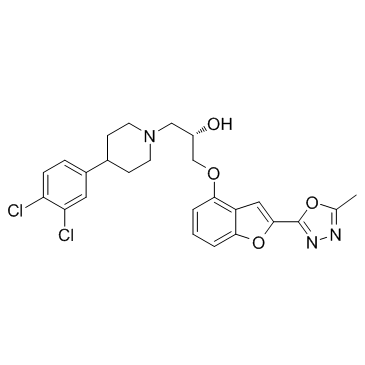| Description |
Wf-516 is an inhibitor of 5-HT reuptake, and an antagonist of 5-HT1A and 5-HT2A receptors, with Ki of 5 nM and 40 nM for 5-HT1A receptor and 5-HT2A receptor in humans, respectively, and has potent antidepressant activity.
|
| Related Catalog |
|
| Target |
Ki: 5 nM (Human 5-HT1A receptor), 40 nM (Human 5-HT2A receptor)[1]
|
| In Vitro |
Wf-516 shows high affinity for 5-HT1A receptors in the hippocampus and raphe nucleus of rats with Ki of 8.1 nM and 7.9 nM, respectively[2].
|
| In Vivo |
Wf-516 (0.5 mg/kg, i.v.) does not induce any change in the firing activity of 5-HT neurons, but significantly blocks the inhibitory effect of 8-OHDPAT (a 5-HT autoreceptor agonist) by 70%. A full dose-response relationship between the suppression of DRN firing activity and different doses of LSD shows a significant fourfold shift to the right in the Wf-516 pretreated rats (ED50 = 32.4 ± 1.0 μg/kg) as compared to controls (ED50 = 7.5 ± 1.2 μg/kg). After intravenous administration of successive doses of 1.25 mg/kg of Wf-516 (up to 10 mg/kg), the effect of microiontophoretically applied 5-HT is prolonged and reaches statistical significance at 7.5 mg/kg. At this dose, the RT50 value is increased by 53% and, by 75% at the highest dose of 10 mg/kg of Wf-516 used[1]. Oral administration of 30 mg/kg Wf-516 to these 5,7-DHT-treated rats induces a significant decrease of BPND in the hippocampus as compared with baseline, but no additional reduction of BPND is observed in the raphe nucleus. Oral ED50 values for Wf-516 in the hippocampus and raphe nucleus are 5.3 mg/kg and 4.2 mg/kg, respectively[2].
|
| Animal Admin |
A series of 6 and 5 dynamic PET scans is performed for each rat approximately 5 h and 30 min after oral and intraperitoneal pretreatments with graded doses of Wf-516 (vehicle only, 1, 3, 10, 30 and 100 mg/kg) and pindolol (vehicle only, 1, 3, 10 and 30 mg/kg), respectively. Scans for the same individual rat receiving Wf-516 (n = 4) and pindolol (n = 3) are conducted more than 2 weeks and 1 week apart, respectively. PET imaging is also carried out for rats receiving oral administration of 30 mg/kg fluvoxamine dissolved in 0.5%HPMC 30 min before pindolol treatment in order to investigate the effects of fluvoxamine-induced increase of endogenous 5-HTs on the measurements of 5-HT1A receptor occupancies.
|
| References |
[1]. El Mansari M, et al. In vivo electrophysiological assessment of the putative antidepressant Wf-516 in the rat raphe dorsalis, locus coeruleus and hippocampus. Naunyn Schmiedebergs Arch Pharmacol. 2008 Jan;376(5):351-61. Epub 2007 Nov 30. [2]. Saijo T, et al. Presynaptic selectivity of a ligand for serotonin 1A receptors revealed by in vivo PET assays of rat brain. PLoS One. 2012;7(8):e42589.
|
